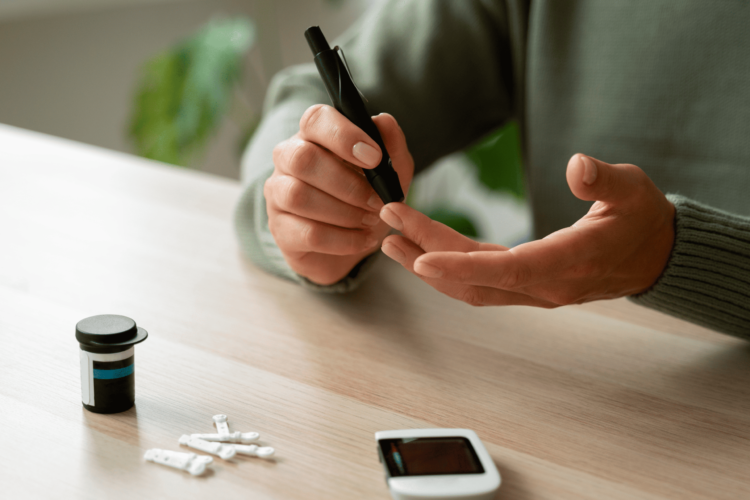Diabetes is a persistent disease that affects millions of people around the world: during diabetes, not only glycemic control, but also the work of the entire body, including the reproductive system. Most of the females get to suffer from some of the problems such as missed periods, prolonged periods, low periods, or issues in bearing children due to complications that result from diabetes. In this blog post, we will review the comorbidity of diabetes and menstrual issues, what may bring them on, as well as the natural approaches to addressing them.
How Diabetes Affects Menstrual Health? An Overview
Menstrual cycle of the female body depends upon certain hormones such as Estrogen, Progesterone and insulin. Diabetes, especially Type 2 and insulin resistance, can disrupt this balance, leading to:
Irregular Periods: Ovulation is disrupted since insulin levels are high one week and low the next week.
Polycystic Ovary Syndrome (PCOS): Hypersensitivity to insulin is closely connected with PCOS and leads to hormonal dysfunctions and irregular menstrual cycle.
Heavy or Light Periods: Thus, if a woman does not manage blood sugar correctly, hormones are affected, which results in problems with blood flow and the cycle’s length.
Here’s an indicator of the common symptoms of menstrual problems related to diabetes:
- Irregular or skipped periods
- Severe PMS symptoms
- Unusually heavy or light flow
- Sudden weight loss or gain or acne especially women with PCOS.
And this involves getting tired more easily and having changes in mood.
These are just but some of the symptoms of diabetes, if you happen to have any of these you should seek medical advice from a doctor.
Causes of Menstrual Irregularities in Diabetic Women
Hormonal Imbalance: Other hormones that need to be regulated during menstruation are also affected by insulin resistance.
Obesity: Obesity constitutes a risk factor in diabetes and ac haemorrhage, irregular menstruation being regarded as an aspect of the chronic disorder.
Stress: High stress levels also increase cortisol; add to insulin and menstrual cycles complications.
Polycystic Ovary Syndrome (PCOS): A direct outcome of insulin resistance because of diabetes.
Natural Woman: How to Manage Diabetes and Menstrual Problems Effectively
Treats for both afforded entail the best solution to rehabilitate hormonal symphony and also ensure blood sugar stability.
Dietary Modifications:
Follow a nutrition plan with adequate intake of fiber, whole grain, fruits, and vegetables, lean meats in moderation.
It has also shown that high stress causes poor diet especially consumption of foods that contain refined sugars and processed foods which lead to increase blood glucose.
Regular Exercise:
Aerobic exercise such as yoga, brisk walking or swimming maintain the insulin and hormones in the body.
Practices like meditation, mindfulness, and deep breathing exercises can reduce stress and its impact on the body.
Ayurvedic Solutions:
Ayurveda offers personalized treatments to address both diabetes and hormonal imbalances. By focusing on root causes, Ayurveda helps restore balance naturally. For instance, diabetes ayurvedic treatment in Kerala provides therapies like herbal medicines, dietary guidance, and detoxification methods that help regulate both blood sugar and reproductive health.
Ayurveda: A Natural Path to Hormonal Balance
Ayurveda views health as a balance between mind, body, and soul. Ayurvedic therapies such as Panchakarma, herbal formulations, and yoga offer holistic solutions to manage menstrual problems associated with diabetes.
In
ayurvedic treatment in Kerala, India, experts focus on detoxifying the body, improving insulin sensitivity, and regulating hormonal imbalances through natural methods, ensuring long-term health benefits.
When to Seek Medical Help
If one continued to experience these symptoms at home, it is advisable to visit a doctor or an Ayurvedic doctor if the situation concerns diabetes. Early management help to avoid such issues as infertility, endometrial hyperplasia, and serious signs of PCOS.
Conclusion
This map shows that diabetes and menstrual problems have an association and thus it’s good to manage the two conditions well. Nutritious meals and other diet control, exercise, stress management, and methods of ayurveda by combining them can help women gain back the hormonal balance and health. If you are inspired to look for the natural remedies, then you should try going to the Ayurveda as the possible solutions are in great deal and if you specifically want to try the
best diabetes ayurvedic treatment Kerala has to offer, then you should consult with the trusted healthcare centers.
A holistic health checklist you could start incorporating into your eating habits today to sustain and improve your hormonal and metabolic functioning properly.



0 Comments